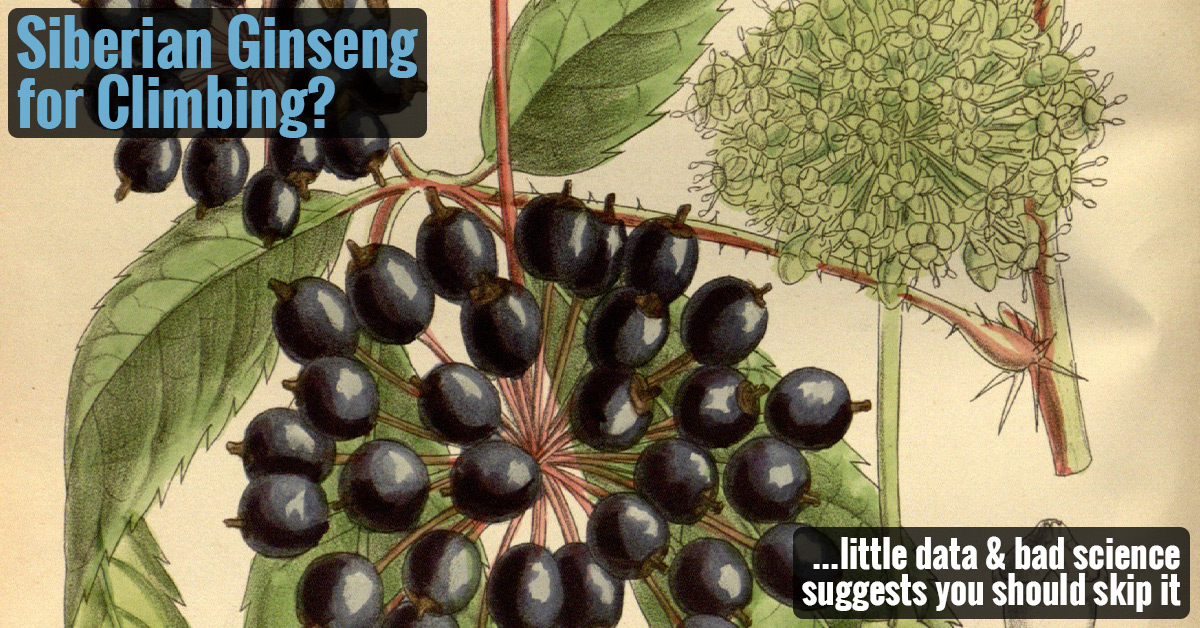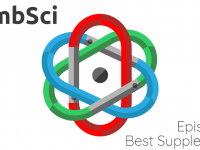I recently wrote a supplement guide on Siberian ginseng, also known as ciwujia. My goal with the supplement guides is to put the facts out there as best as can be determined by the science available, but this leads to a colder, more academic-feeling article. I think it’s important to have these articles out there—I wouldn’t write them otherwise!—but I also like to take a second, more personable approach on each of the supplements I’ve reviewed.
If you read the supplement guide, then you know already that I don’t recommend Siberian ginseng as a supplement. Now, I’d like to put that in a bit more context and discuss the larger picture surrounding the (non-) recommendation. This will provide a bit more background for those of you who have read the article and a suitable primer for those who have not.
There’s Not Much Science on Siberian Ginseng
The first and most problematic aspect about Siberian ginseng is that there just isn’t a lot of data to support it one way or the other. This is a problem because we need data to drive science-based decisions!
The first supplement guide I ever wrote, on Beta-Alanine, had 29 references. There were certainly more out there I didn’t reference (because they weren’t relevant to the guide itself), and there have been 7 new references effectively “added” to the guide in the 2017 update. The supplement guide on creatine had 46 references, and the one on caffeine had 99! More references means better analysis of the type and size of effect a supplement has, and more confidence in the conclusion.
Only one guide I’ve written has used fewer references: the one on citrulline malate, which had only 8. All of that research agreed with itself about what citrulline malate did and how it did it, though—this isn’t true about Siberian ginseng—and I made it clear in the conclusion that the expected benefits of citrulline malate were only preliminary and need to be backed by further research.
With Siberian ginseng, not only is there not a lot of data on the herb, but it is highly conflicting. Half the studies suggest it doesn’t do anything (the more methodologically sound studies, for what it’s worth), and the rest gather a smattering of benefits together that could probably be adequately explained by a single benefit (improved fat metabolism) but do so without forming a cohesive picture for the method of action, instead often relying on the meaningless term “adaptogen” to explain away how the herb works.
To be sure, there’s a lot of studies I didn’t reference on Siberian ginseng, but that’s because the majority of “trials” were murine or in-vitro, neither of which gives us much of a clue about how effective the herb will be in a human population. When there’s a ton of mouse and cell culture trials but a paucity of human trials—especially after decades—it’s a sign that there’s no real promise and that most scientists have moved on.
The Science Isn’t Rigorous
A second problem is that the science demonstrating Siberian ginseng to be effective was, by-and-large, not methodologically sound. The papers with positive findings suffered from a variety of problems, including a lack of placebo controls in a couple cases!
When looking at rigorous trials, the results were almost uniformly negative. Only one trial—published in 2010 in the Chinese Journal of Physiology—found any benefit, and it was frankly a little unbelievable given the extremely large size of the effect (an almost 8-fold improvement over the placebo participants). We also have evidence that certain countries, China included, are more likely to publish positive trials, particularly for topics that are culturally important such as acupuncture or Chinese medicine (of which Siberian ginseng, “ciwujia”, is included). While we cannot say if that was a factor in this particular case, it does raise some doubt, especially when weighed against the other, uniformly negative rigorous trials.
Herbs Are Suspect In General
Plants have given us a large number of medicines; there’s no doubt that some plants contain potent active ingredients with very real physiological effects. The problem is that herbs, compared to drugs, are not easily controlled for dose, often not well-studied for effect, and sometimes are mislabeled or just plain substituted. As the neurologist Steven Novella has described them, herbs are basically poorly regulated drugs, and that gives them the potential to be either dangerous or ineffective.
Thankfully, most herbs are the latter—they simply don’t do much or anything. It’s possible that they do contain an active ingredient that in isolation could provide a benefit, but in the “natural wrapper” there is simply not enough, or it’s poorly absorbed, or there are inhibiting factors, etc. Siberian ginseng appears to fall into this category. We know it contains two active ingredients, the eleutherosides (from the root) and the ciwujianosides (from the leaves), and it’s likely that these two active ingredients are indeed “active”, but when consumed in the herbal products available on the market they have either no effect or an effect so minor that it might as well be no effect. If we were to concentrate them and ensure their bioavailability, it could be a different story—but at that point, they would just be drugs, and quite probably less effective drugs than options already on the market!
I want to write a whole article exploring this (sometime early next year), so I’m not going to wax on about it now, but the bottom line here is that most “herbal medicines” have either been refined into well-regulated, well-understood, effective medicines (such as the salicylic acid in willow bark into the acetylsalicylic acid [aspirin] we take for headaches, or the purified digoxin from foxgloves) or are of little to no practical use. There may be exceptions out there, but Siberian ginseng isn’t one of them.
Skip the Siberian Ginseng
This is an article to provide the context behind my reasoning, but regardless of whether you agree with my rationale or not, it’s clear from the studies that Siberian ginseng is ineffective. As always, I remain open to the possibility that future (rigorous) studies can change my mind, but given the lack of data after over twenty years of study, it seems clear that most sports scientists have moved on from Siberian ginseng; they understand that it holds little promise to an athlete, and they’re not going to waste their time or funding on a project with no hope.
If you’re looking to improve fat metabolism during exercise, you’re better off sticking to green tea. It’s still not necessarily effective, but there are more rigorous trials demonstrating this effect (due to the catechins and caffeine in green tea) than there are for Siberian ginseng, and at the very least green tea is a relatively cheap, extremely tasty beverage—and that’s worth it alone!














